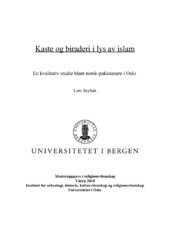| dc.contributor.author | Skybak, Lars André | eng |
| dc.date.accessioned | 2010-08-31T10:23:04Z | |
| dc.date.available | 2010-08-31T10:23:04Z | |
| dc.date.issued | 2010-05-18 | eng |
| dc.date.submitted | 2010-05-18 | eng |
| dc.identifier.uri | https://hdl.handle.net/1956/4056 | |
| dc.description.abstract | Sammendrag Denne oppgaven undersøker betydningen av kaste og biraderi blant norsk - pakistanere, sett i lys av deres religionsutøvelse. Disse strukturene er å forstå som sosiale systemer av forventninger mellom grupper og individer. Biraderi er en endogam enhet, ofte på landsbynivå. Kastesystemet skaper hierarki av gjensidig avhengige grupper. Biraderi skaper en subkaste til kasten som er en mer omfattende enhet enn biraderiene føler tilknytning til og som kan ha betydning for biraderiets plassering i det lokale hierarkiet. For å utforske oppgavens problemstilling har jeg gjennomført kvalitative intervjuer med åtte informanter. Deres bakgrunn, i form av deres familiers migrasjonshistorie, deres transnasjonale kommunikasjon med slektninger i Pakistan og deres religionsutøvelse, presenteres. Dette gir et inntrykk av informantene som er verdifull for å utforske hvordan de forholder seg til forventninger fra sine omgivelser når det kommer til de sosiale strukturene biraderi og kaste. Endogamien av enhetene i strukturene gjør ekteskap til et sentralt anliggende. Som systemer av forventninger vil bærere av strukturene forvente av andre at endogamien opprettholdes. Et eksempel på dette vil være mine informanters foreldres forventning om at de skal gifte seg innen kaste eller biraderi. Informantenes respons til denne type forventninger er et sentralt tema. Mange av informantene uttrykker motstand til kastesystemet, noen av de avviser det som uislamsk. En informant har bestemt seg for å akseptere ekteskap innenfor kasten. Noen blant informantene forventes å gifte seg med slektninger; en av dem forklarer hvordan dedikert religionsutøvelse bidrar til motstanden mot ekteskap innen biraderistrukturen. Jeg undersøkte også holdningene ovenfor disse strukturene hva angår informantenes håp for fremtiden. Alle informantene vil at deres barn skal gifte seg med muslimer og de ønsker ikke at barna skal opprettholde kaste- eller biraderistrukturene. Dette får meg til å stille spørsmålet om islam kan bli den nye endogame enheten for norsk-pakistanere og dermed erstatte kaste og biraderi. | en_US |
| dc.description.abstract | Abstract This thesis investigates the meaning of caste and biradari structures among Norwegian Pakistanis, seen in the context of their religious practice. These structures are to be understood as social systems of expectations between groups and individuals. A biradari is an endogamous kinship unit, often working on a village level. The caste system forms a hierarchy of mutually dependent groups. The biradari forms a sub-caste to the caste which is a more overarching unit that biradaris may feel a connection to, and which may designate the biradari to a certain place in the local hierarchy. In order to investigate the thesis' research agenda, qualitative interviews have been conducted with eight informants. Their background, in terms of the migratory history of their family, their transnational communication with relatives in Pakistan and their religious practices, is presented. This gives an impression of the informants that is valuable for exploring the way they handle expectations from their surroundings concerning the social structures of biradari and caste. The endogamy of the units in the structures makes marriage a central concern. As systems of expectations, bearers of the structures will expect others to adhere to the endogamy. An example of this would be parents of my informants expecting them to marry within the caste or the biradari. The way the informants respond to such expectations is a central theme. Quite a few among the informants express opposition to the caste system, some of the repelling it as un-Islamic. One informant has decided to accept a marriage within the caste. Some informants are expected to marry a relative; one of these explains how his devout practice of Islam contributes to his opposition to marriage within the biradari structure. I also inquired into the attitudes towards these structures as concerns the informants' hopes for the future. The informants all want their children to marry Muslims and they do not want their children to sustain caste or biradari structures. This leads me to hypothesize that Islam might be the next endogamous unit for Norwegian Pakistanis, replacing caste and biradari. | en_US |
| dc.format.extent | 594806 bytes | eng |
| dc.format.mimetype | application/pdf | eng |
| dc.language.iso | nob | eng |
| dc.publisher | The University of Bergen | eng |
| dc.subject | Innvandrere | |
| dc.subject | Kastevesen | |
| dc.subject | Slekter | |
| dc.subject | Sosiale strukturer | |
| dc.subject | Ekteskap | |
| dc.subject | Islam | |
| dc.subject | Pakistanere | |
| dc.title | Kaste og biraderi i lys av islam: En kvalitativ studie blant norsk-pakistanere i Oslo | nob |
| dc.type | Master thesis | |
| dc.rights.holder | Copyright the author. All rights reserved | |
| dc.rights.holder | The author | eng |
| dc.description.degree | Master i Religionsvitenskap | |
| dc.description.localcode | MAHF-RELV | |
| dc.description.localcode | RELV350 | |
| dc.subject.nus | 714999 | eng |
| dc.subject.nsi | VDP::Humaniora: 000::Teologi og religionsvitenskap: 150::Religionsvitenskap, religionshistorie: 153 | |
| fs.subjectcode | RELV350 | |
